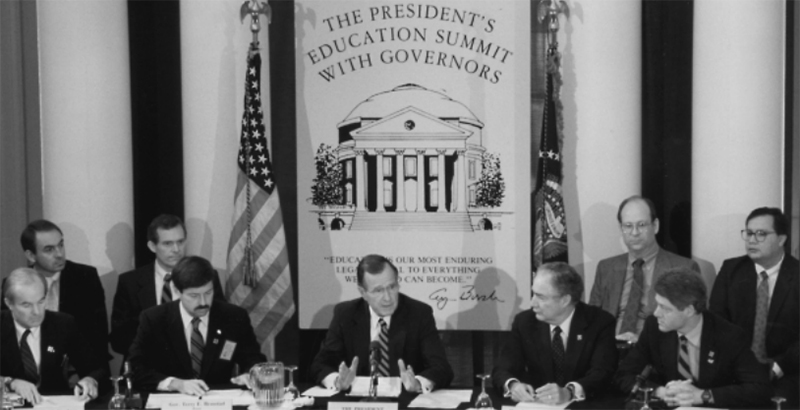Analysis: 30 Years After Pivotal Charlottesville Education Summit, State Leaders Must Again Come Together to Create a New Vision for America’s Public Schools

To commemorate the 1989 Education Summit in Charlottesville, Virginia, that convened 49 of the nation’s 50 governors to discuss a single policy issue — the education of America’s children — the Aspen Institute’s Education & Society Program is partnering with The 74 to produce a series of Q&A’s with distinguished leaders across politics, education and advocacy to reflect on the legacy of the summit and what lies ahead for public education. The interviews were conducted over the telephone, transcribed and edited for clarity and length. Participants were asked some of the same questions, but also queried specifically about their careers and backgrounds. These leaders share their thoughts on why the summit was a groundbreaking event, the strengths and shortcomings of education policy and what is required for propelling further gains for students. You can see all the interviews here.
Three decades ago, state leaders saw that public education was in peril and called on Americans to embrace change commensurate with the challenge. The 1989 Charlottesville Education Summit and the agenda it produced laid the groundwork for important progress in American education. By learning from this history, state leaders can establish a new foundation on which to stake the next generation of gains.
It is past time to refresh this agenda to respond to new challenges in education and society. The Aspen Institute has an important role in framing these issues: We convene leaders with different experiences and divergent perspectives so they can learn from others, challenge their own assumptions, and identify threats and opportunities on the horizon. We help leaders forge coherence across practice and policy and across programmatic silos, from capitals to classrooms.
Throughout this series, we’ve heard from eminent leaders from across the political spectrum about the valuable infrastructure of standards, assessments and accountability:
Governors need to … support good testing and accountability. The students who will suffer when we lower our standards are those who are already underserved. —Gov. Jim Hunt
If I were governor today, I would probably be doing exactly what I did in the 1980s, which is pushing for higher standards on the national goals and effective tests to measure progress towards the goals. —Sen. Lamar Alexander
Notably, school district superintendents charged with making these big ideas come to fruition also support this framework:
I can tell you that having a common set of standards that are grade level appropriate and rigorous changed the conversation about what should be happening in classrooms. It allowed administrators to push for needed change and rigor to occur in our classrooms. —Chicago Public Schools CEO Janice Jackson
[I]t is important to reiterate that it is only because of the movement toward standards and assessments that we are able to have thoughtful conversations about differences in student performance. This continues to be the most important outcome of the past 30 years. —former District of Columbia Public Schools chancellor Kaya Henderson
As we focus on the future, we would be wise to safeguard the important commitments and infrastructure for improvement that comprise the summit’s lasting legacy.
The leaders who shared their views in this series, however, also articulated important criticism of how this agenda has unfolded:
There is finally more energy and commitment to a conversation about the fact that the trauma of poverty is real, and therefore providing, or at least beginning to talk about providing, trauma-informed care to young people, is now on the table in a way it wasn’t [in 1989]. —Teach for America Vice President Brittany Packnett
As we became more accurate in measuring, we moved quickly into high-stakes testing that I think probably didn’t serve us very well because we assumed that the tests were more than just a snapshot in time, that they really could tell us more than what they actually could. —Gov. Tony Evers
It was a larger accomplishment than most people thought to say our goals are math, science, English, history and geography. That meant the school curricula across the country shifted in that direction, and that means there’s less time for music and art and less time for character education. —Alexander
While the [English learner] population has grown 60 percent over the past two decades, federal funds for ELs have increased by, wait for it, 1 percent since 2009. That’s just unacceptable. —Unidos US President and CEO Janet Murguía
There are many legitimate critiques worth addressing that can make standards-based reform more effective. Recalibration of the role of tests, targeted investments to help students who need more help, a broader and richer curriculum — all are good ideas that deserve attention.
But what is most striking is how current debates propose tinkering with the status quo when this is patently inadequate to prepare for the future. The demographics of public school students, the advent of school choice, disruptive technology — all this is very different in the past 30 years, but the same policy framework is applied.
Employability skills have shifted, and the media landscape has changed how news is consumed and politics are conducted, but accountability for schools hasn’t changed much at all. The architecture of test-based accountability contained a heavy tilt toward basic skills, which arguably was appropriate for getting a system to move from poor to fair. Nevertheless, different strategies are needed to go from good to great, and to prepare young people for college, work and citizenship opportunities of the future, not the past.
I’ve become a little more radicalized about this. I think the system we have is inappropriate for the world we live in. It’s not yielding lifelong learners. The idea that we have silos of pre-K, K-12, community college, university, to me, it’s increasingly irrelevant. We should turn the system on its head and make it student-centered. If I was convening a group of 50 governors, I would ask, “How do we get to a point where every child reaches their God-given abilities,” rather than “How do we increase the graduation rate?” —Gov. Jeb Bush
The world for which we are preparing students has changed dramatically in the past 30 years. We’re trying to ready a much more diverse set of students, not just to higher standards, but to become lifelong learners, adept at navigating adversity and change, and able to thrive in a pluralistic democracy and society. Yet, for better and worse, the standards-based testing and accountability agenda that was articulated in Charlottesville 30 years ago still dominates federal law and state policy. We haven’t really asked schools to address the challenges of the future, and we haven’t developed a policy framework that is aimed enough at innovation and transformation.
Just as governors did in 1989, state policymakers today have an opportunity, and a responsibility, to re-envision student and school success. They can use this vision to lay a new foundation for education policy.
The time for state leaders to lay this new foundation is now. The consensus that informed the 1989 Charlottesville Education Summit and animated education policy for the past 30 years does not currently exist. Americans are weary of federal overreach and ideological agendas that overpromise and underdeliver. There is a hunger for leadership that speaks to values, engages and really listens to stakeholders, attracts broad and durable support, and sparks collective action rather than preying on division and fear.
Public education is among the most important commitments we make to each other as Americans. States have primary responsibility for this enterprise, both historically and in our constitutional structure. We must envision a future in which all young people have the educational opportunities and experiences needed to develop into their best selves, to gain a foothold in the future of work and to participate actively in our democracy. That demands new goals and new policies to get there. In my interview with Hunt, he urged a new call to arms. We should heed his call.
Ross Wiener is vice president at the Aspen Institute and executive director of its Education & Society Program. Previously, he was vice president for program and policy at the Education Trust and a trial attorney in the U.S. Department of Justice, Civil Rights Division, Educational Opportunities Section.
Get stories like these delivered straight to your inbox. Sign up for The 74 Newsletter

;)
